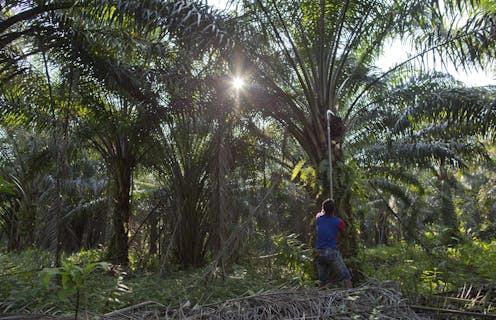
Palm oil is found in half the products sold in supermarkets and in biofuels. Around 50 per cent of the world’s supply is grown in Indonesia, mostly on massive plantations.
Government land concessions granted to oil palm corporations now cover a third of Indonesia’s farmland, depriving many villagers of access to resources that once sustained them.
Indonesia’s governments have consistently supported plantation corporations at the expense of smallholder farms (defined as farms with less than 25 hectares). As the land minister stated in 2019, “if (the lands) aren’t productive in the hands of the people, then we will take away the lands…The fact is that the fastest machine to generate wealth is corporate.”
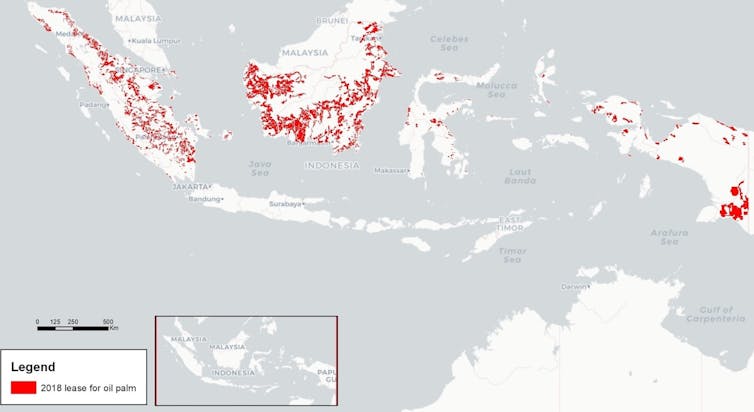
Officials assume that plantation corporations are efficient “machines” but our research indicates that corporate plantation efficiency is a dangerous myth.
Plantations out-competed
Globally, crops such as cacao, coffee, tea and rubber previously grown on plantations are now grown mainly by smallholders because they can produce similar yields with lower costs.
Some observers argue that oil palm is different. They note that average yields are higher on plantations than smallholdings, but averages mask significant variations.
Industry analysts tracking 18 major plantation corporations found yields ranging from 14 to 26 tons of fresh fruit per hectare; the range among hundreds of smallholders in our research site was similar.
Read more: Growing palm oil on former farmland cuts deforestation, CO₂ and biodiversity loss
A key reason that some smallholders have low yields is their lack of access to the high quality seeds used on plantations — seeds that yield up to 66 per cent more tons of fruit. Yet a government program to supply smallholders with high-yielding seeds has stalled: after five years it has achieved barely 10 per cent of its target.
If oil palms grow just as well on small fields as on big ones (given the same seeds, like for like), how do other dimensions of efficiency compare?
Efficiency in land use
Of the 22 million hectares the government has granted to oil palm plantation corporations, only 10 million hectares have been planted.
Much concession land is steep, peaty and ecologically fragile. Oil palm can be grown there but costs are high and yields low. Nevertheless, managers pressed to meet corporate targets often plant palms on unsuitable land.
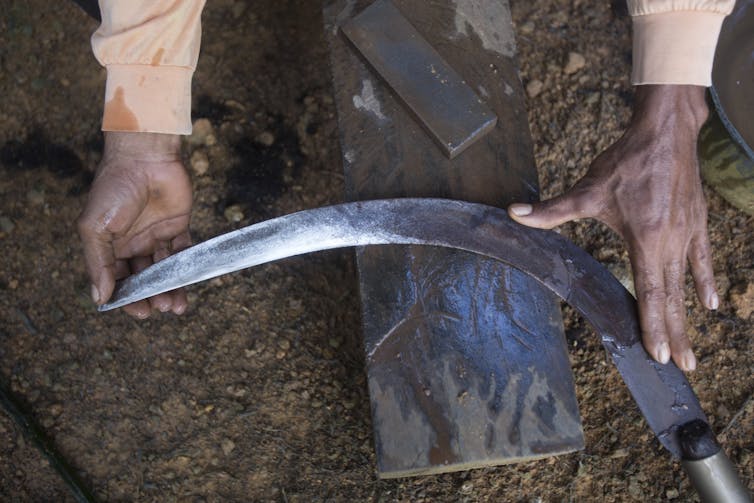
Indonesia’s smallholders and Indigenous communities do not proceed so wastefully. They make sustainable use of forest resources and select crops suited to each patch of land, while making wise use of their money and effort. As a result they can respond more flexibly to the changing climate. Yet they are barred from making any use of the land plantation corporations hold in their concessions, much of it unplanted, and many go hungry.
Saving on labour costs
Growing oil palm is simple. Men harvest the fruit manually with a sharp knife attached to a long pole; women spread fertilizers and herbicides from containers carried on their backs.
Field tasks are carried out in the same way on plantations and smallholdings. The difference is that plantations also need managers, accountants, overseers and guards, incurring high costs.
Read more: Major palm oil companies broke their promise on No Deforestation – recovery is needed
Seeking to reduce their wage bill, plantation corporations increasingly replace full-time employees with casual and outsourced workers who do not qualify for pensions, health care, family housing or other benefits.
Yet plantation labour “efficiencies” come with a price: in the plantations we studied, inconsistent labour supply led to poor maintenance and unharvested fruit.
The challenge of transportation and milling
Transportation and milling loom large in industry narratives about the superior efficiency of the plantation format, as palm fruit must reach the mill within 48 hours before it spoils. But the large size of plantations creates challenges of its own.
A private plantation we studied built 258 kilometres of roads to collect palm fruit but during the rainy season many roads became impassable; for months, tons of fruit were left to rot.
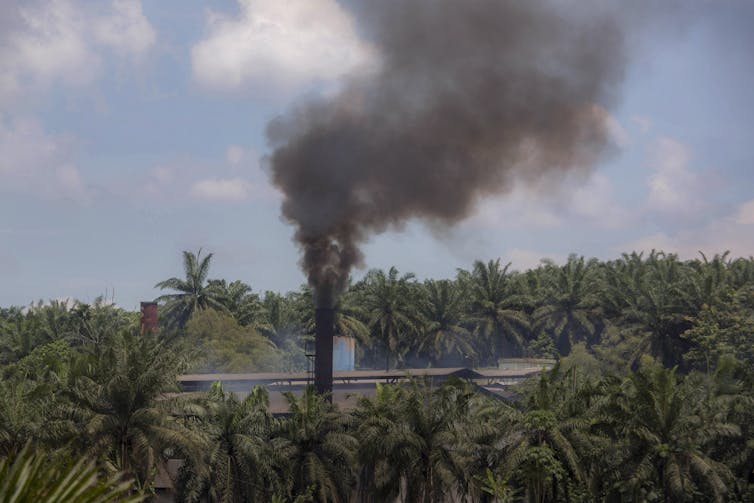
There was also a bottleneck unloading the palm fruit at the mill where trucks waited, sometimes overnight. And the mill operated at less than half its capacity — a common problem in Indonesia where corporations have built mills that are much bigger than needed.
In Thailand, where smallholders grow 80 per cent of the oil palm, and in parts of Sumatra where independent smallholders are well established, villagers use local roads and small trucks to transport their fruit to small mills located nearby. However in Kalimantan where 86 per cent of the palms are grown on giant plantations, giant inefficient mills are the norm.
Principals and agents
Plantations also suffer from what economists call the “principal-agent problem”: the principals (corporations and their shareholders) must rely on agents (managers and workers) to carry out production, but their interests are often distinct.
Corporations seek profit, shown on company balance sheets. Managers and workers seek to capture some of the money that circulates through and around plantations before it flows away. We saw this problem enacted in the form of widespread theft.
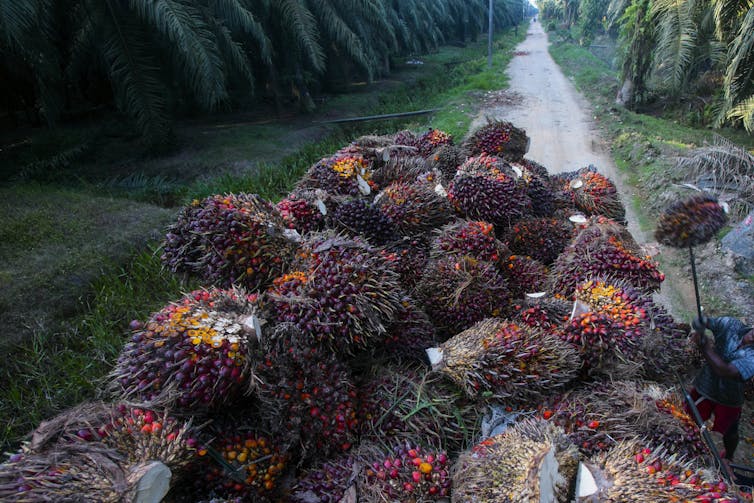
From plantation directors and managers through to field workers, “agents” found ways to supplement their incomes. Managers inflated contract prices, foremen stole their workers’ pay, and fruit, fuel and equipment disappeared at night. Villagers also stole from the plantations and sometimes blockaded roads or mills to protest corporate unfairness and neglect.
Conflict and theft create inefficiency. So long as they farmed on their own land, smallholders in our study did not have these problems. While not perfect, moral codes supplied forms of social control that were lacking in relations between principals and agents on nearby plantations.
If Indonesia’s plantations are not efficient, why do they survive?
In the 1930s, the Dutch colonial government protected struggling rubber plantations by suppressing competition from smallholders. Today’s oil palm smallholders are suppressed indirectly by government policies that favour corporations.
Read more: How palm oil became the world's most hated, most used fat source
In our research area, five corporations occupied most of the farmland, leaving smallholders who wanted to grow oil palm without access to this lucrative crop. They calculated that adding six hectares of oil palm to their mixed farms would enable them to feed their families, maintain their farms and invest in education.
Making corporate plantations more efficient would not address this fundamental unfairness. Only by challenging the myth of corporate efficiency can we hope to provide better opportunities, and a more prosperous future, for Indonesian farmers.
Tania Li receives funding from Canada's Social Sciences and Humanities Research Council. She is currently a visiting research fellow at the Center for Southeast Asian Studies, Kyoto University.
Pujo Semedi receives funding from Universitas Gadjah Mada.
This article was originally published on The Conversation. Read the original article.







